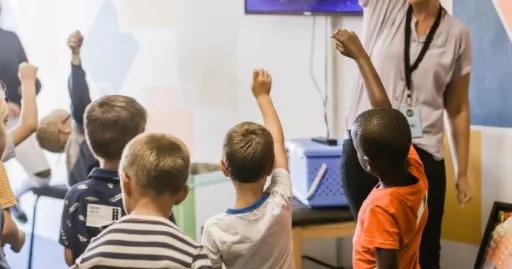Special Programs
Academic Social Communication Program (ASC)
The Academic Social Communication program is a self-contained classroom designed to meet the individual education needs of students K-12. Students in this program require specialized instruction in the areas of academic, social skills, and communication. These needs are substantial enough to prevent the student from being able to progress in a resource or general education setting and may require intensive instruction/support for much of the school day. Students may access their general education classroom independently or with assistance for core content and other instruction. The curriculum is based on modified grade level Davis Essential Skills and Knowledge (DESK) Standards with accommodations as needed. In addition, direct instruction and other special education programming is used to support student growth. Students may also benefit from a Behavior Intervention Plan if their behavior interferes with learning in the classroom.
Essential Elements Program (EE)
The Essential Elements program is a self-contained program designed to meet the individual education needs of students’ k-12. Students in this program demonstrate severe and complex intellectual and adaptive functioning needs across all environments. Students perform significantly below age expectations even with program modifications, adaptations, and accommodations. It is expected that the student will require extensive ongoing support for daily living, through adulthood.
Student IEP goals and behavioral interventions require intensive, repeated, modified, and direct individualized instruction. To the extent appropriate, students may access the general education environment based on needs identified in the individualized education plan. Academic curriculum is based on the Essential Elements of the Davis Essential Skills and Knowledge (DESK) Standards using tiered instruction, discrete trial teaching, and task analysis. Students will participate in state and district testing using the alternative assessment.
Social Behavioral Program (SB)
The Social Behavioral program is a self-contained classroom designed for students whose externalizing and/or internalizing behaviors are the primary impact on their education. Students in this program may qualify under a variety of disability categories. The students Behavior Intervention Plan requires intensive support throughout the school day. Students are instructed in the Davis Essential Skills and Knowledge (DESK) Standards.
Social Behavioral classrooms are structured with additional support, accommodations, and modifications in the areas of behavior and social skills. Participation in the general education classroom is contingent on behavioral performance as indicated on the students’ Behavior Intervention Plan. Social Behavioral teachers use interventions to help teach behavioral change and support positive behavior expectations in the educational environment. Classrooms utilize level systems and individual/group reinforcement programs to encourage and support positive behavioral expectations.
Behavior Communication Intensive Support (BCIS)
BCIS – Behavior Communication Intensive Supports Program. The BCIS programs are designed for students who have not been successful in previous self-contained placements even with individual supports. The students placed in a BCIS program require intensive supports with behavioral and communication skills. The referral for these programs is directed through the Davis District Human Rights Committee.
Medically Fragile Program
The Medically Fragile program is designed for students whose medical needs cannot be supported in another type of program. The student's health is the primary focus. The IEP team, school nurse, and Special Programs personnel may be involved in determining if a student's medical needs require this program.

